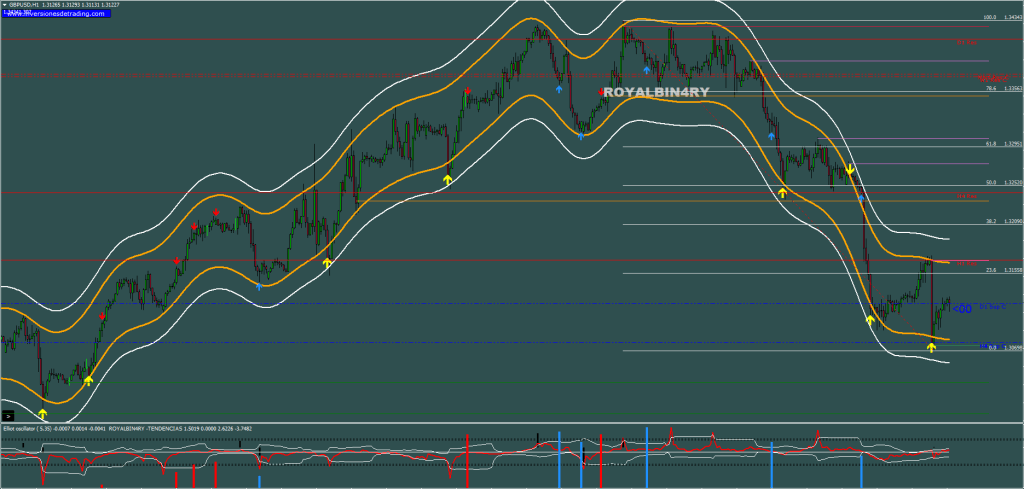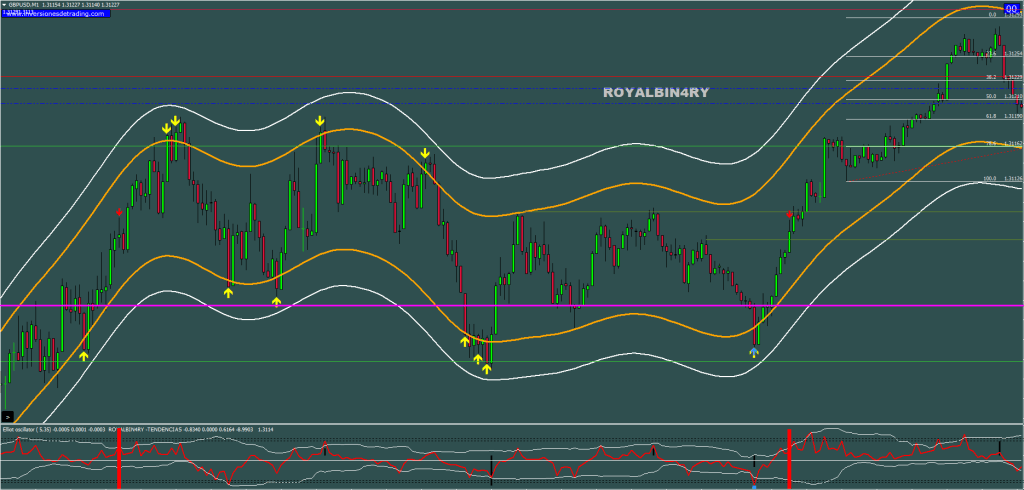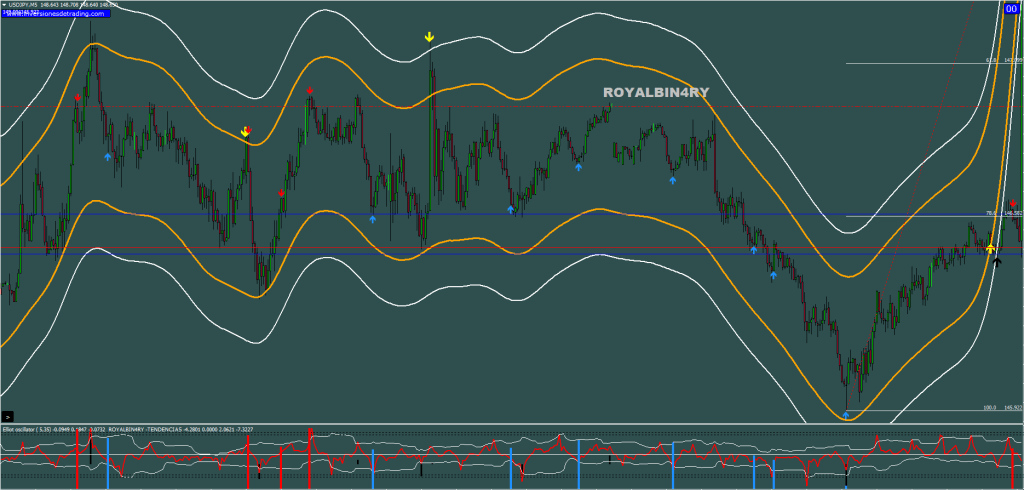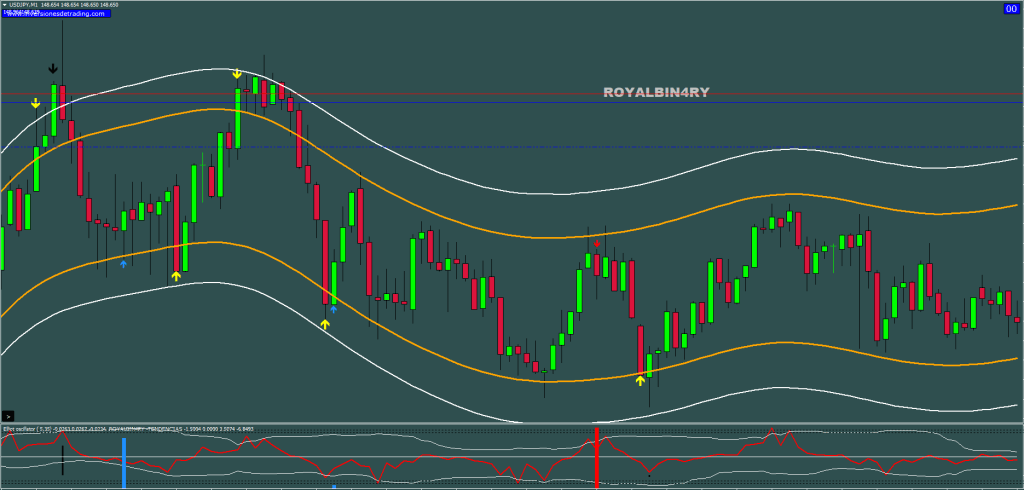This Binary Options Strategy is a trend reversal strategy designed for Binary Options trading, but it can also be adapted for forex trading. This strategy is primarily based on price action and utilizes various forms of support and resistance to confirm trades.
The approach combines dynamic support and resistance levels, static support and resistance lines, and algorithmic confirmation to help traders make more informed decisions. While all three confirmations can be used simultaneously, the strategy generally recommends focusing on both dynamic and static support and resistance.
Key Components of this Binary Options Strategy
- Price Action Arrows – Arrows appear on the chart to indicate potential trading signals. The yellow arrow is the primary signal for entering a position.
- Support and Resistance Levels
- Dynamic Support and Resistance – These levels adjust based on price movement.
- Static Support and Resistance – Pre-defined, fixed levels that do not change frequently.
- Algorithmic Confirmation – Adds an additional layer of validation to the trade setup, though it may be optional depending on the trader’s preference.
This Binary Options Strategy is entirely manual. The indicators produce the signals, but any decisions to enter the market and set protection or profitable exit stops will depend on the trader. Therefore, the trader must be familiar with the principles of risk and reward and use initial support and resistance areas to set entries and exits.
This Trend Reversal Strategy can give you trading signals you can take as they are or add your additional chart analysis to filter the signals further, which is recommended. While traders of all experience levels can use this system, practicing trading on an MT4 demo account can be beneficial until you become consistent and confident enough to go live.

You can set this Strategy to send you a signal alert. This is helpful as it means you do not need to stare at the charts all day, waiting for signals to appear, and you can monitor multiple charts simultaneously.
This Binary Options Strategy can be used on any currency pair and other assets such as stocks, commodities, cryptos, precious metals, oil, gas, etc. You can also use it on any time frame that suits you best, from the 1-minute to the 1-month charts. Works best on 1M TimeFrame.
Download a Collection of Indicators, Courses, and EA for FREE
Trading rules for this Trend Reversal Strategy
When using the trend reversal strategy, remember to tighten your Stop Losses around High-Impact News Releases or avoid trading for at least 15 minutes before and after these events.
As always, proper money management is key to achieving good results. To be a profitable trader, you must master discipline, emotions, and psychology. It is crucial to know when and when not to trade. Avoid trading during unfavorable times and market conditions like low volume/volatility, beyond major sessions, exotic currency pairs, wider spread, etc.
For binary options, the strategy works best on a 1-minute chart, with an expiration time of 5 candles. This means that after entering a position, traders should expect the trade to last approximately five minutes.
Call or Buy Signal
- Yellow Arrow – A yellow arrow should appear on the chart, indicating a potential buy opportunity.
- Candle Price Position – The price of the candle should be lower than the first band of the dynamic support and resistance.
- Support Level – The price should rest on a support level, providing a confirmation to enter the trade. (green lines)
Put or Sell Signal
- Yellow Arrow – A yellow arrow should appear, signaling a potential sell opportunity.
- Candle Price Position – The price of the candle should be above the first band of the dynamic support and resistance.
- Support Level – The price should also be near or on a support level. (red lines)
Exit Strategy
- Stop Loss – The stop loss should be placed below the previous swing low for a buy trade or above the previous swing high for a sell trade.
- Profit Target – A minimum risk-reward ratio of 1:1 is recommended. Alternatively, traders can aim to exit at the nearest support or resistance levels.



- Read More Titan Diamond EA FREE Download
Conclusion
This Binary Options Strategy provides a structured approach for traders who want to capitalize on trend reversals in the binary options market. Traders can identify potential entry points by combining dynamic and static support and resistance with price action signals. While the strategy is suitable for binary options, certain elements, such as the directional indicators, might be more applicable to forex trading. Overall, this trend reversal strategy offers a clear framework for managing risk and setting up trades based on technical confirmations.







Admin thx for share !
Good looking price channels + oscillator
Repaint Indicator